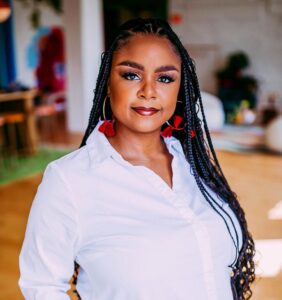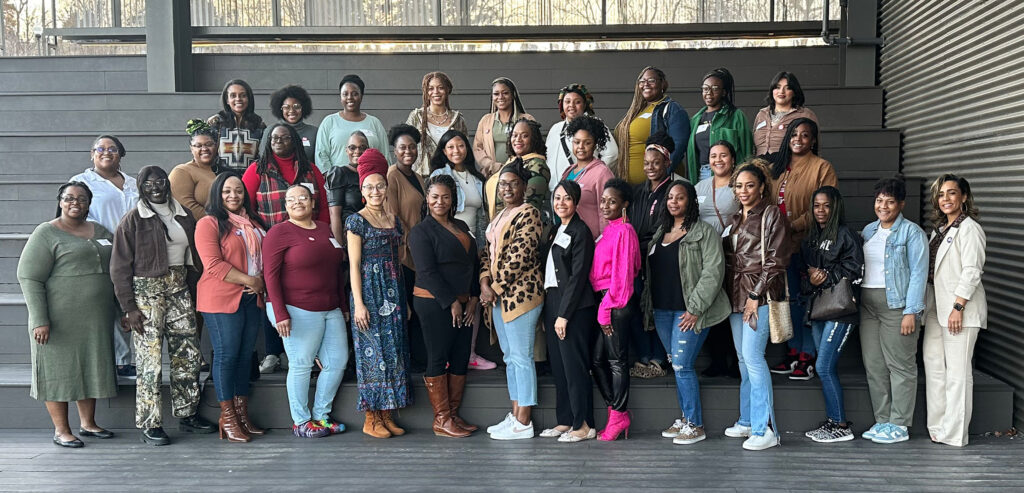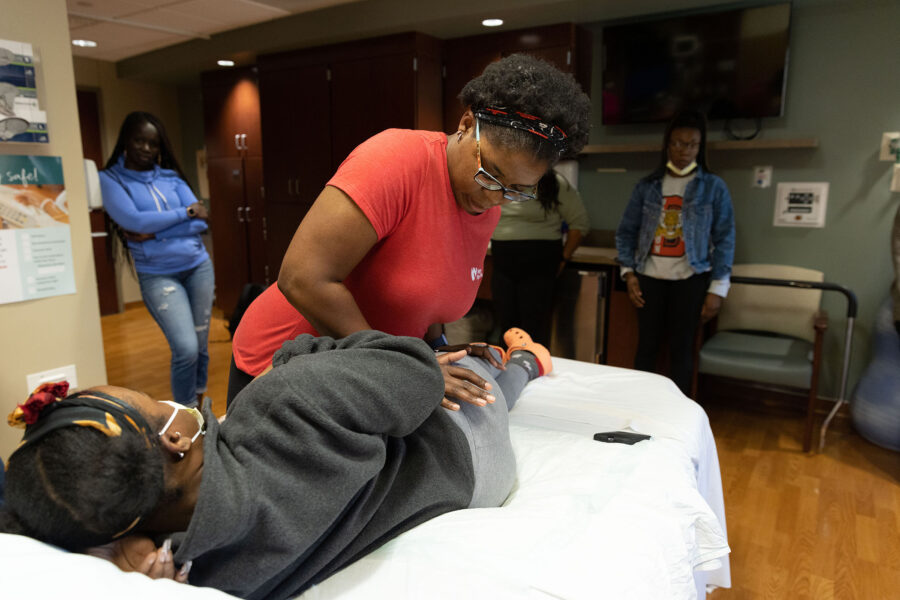When Nebraska Medicine phlebotomist Artnetta Stearns was pregnant with her first child in 2020, her prenatal and birthing experience was difficult, complex and far from what she had imagined it would be.

Due to COVID-19 safety precautions in Texas, where she lived at the time, Stearns attended most of her ultrasounds and doctor’s visits alone. She felt isolated, scared and like she didn’t have a voice. Thankfully, her birthing facility lifted visitor restrictions two weeks before she gave birth, or she would have delivered the baby by herself without support.
“It was a very emotional and trying time,” Stearns said. “My birthing experience wasn’t great, and that’s part of why I wanted to become a doula so that I can help make the experience positive for another mother.”
Stearns was among the first cohort of 40 Black women to complete the Doula Passage Program, a new birth justice service by the local nonprofit I Be Black Girl that was developed in collaboration with Nebraska Medicine and other local health systems. The DPP provides education, support and mentorship to community-based doulas of color, equipping them to support their clients.
“We are excited to curate this intentional space to support the learning and engagement of Black women into community birth work,” said Ashlei Spivey, executive director of I Be Black Girl. “This program is a step towards ensuring Black pregnant people can not only live through their birth experiences but thrive.”

Improving Black maternal health is vital
One reason Nebraska Medicine participated in the DPP project is that Black patients experience unacceptably poor maternal health outcomes in the United States. Black women are three- to four-times more likely to die during or after delivery than white women. Health care quality, underlying chronic conditions, structural racism and implicit bias are some of the factors that contribute to these disparities.
Investing in doulas is one way to bridge this gap in health equity. Doulas offer nonmedical support to their clients by giving them evidence-based information regarding birth and complications. They lead to fewer cesarean rates, emergency room visits, preterm births and more patient satisfaction and breastfeeding. Doulas help ensure their Black clients are seen, heard and receive the care they deserve.
It’s also important that they have access to doulas who look like them.
“Having a Black doula can help them feel safe, knowing that the person who is advocating for them understands their lived experiences and the challenges they face,” said LaTrese Rideout, community outreach specialist at the UNMC Center for Reducing Health Disparities, who also was a member of the latest DPP cohort. “Our women need people like us who are willing to be that support system for them.”
Currently, only 10% of doulas in the U.S. are Black women. The DPP aims to change that statistic and see more representation in the field.
Here are ways to help improve health equity:
- Make the hospital an inclusive space for doulas. If you are a labor and delivery colleague and work with a doula, be accepting of them, have open communication and treat them well.
- Consider becoming a doula. Learn more or apply for the next DPP cohort.
- Join I Be Black Girl for the Reproductive Justice Summit on Friday, Oct. 27.
Developing innovative curriculum to improve health equity
One of the four focuses of the 2022-2025 Nebraska Medicine Community Health Improvement Plan is prenatal health and infant mortality. So, when I Be Black Girl approached Nebraska Medicine about assisting with the DPP curriculum development, the organization was honored and enthusiastic to participate, said Shanda Ross, director of Engagement, Outreach and Belonging.
The 10-week DPP training program covers a variety of topics, from birthing to feeding/lactation and postpartum care. Nebraska Medicine developed two curriculum segments: maternal health basics and serving LGBTQIA+ families and communities.
Heather Ramsey, nurse midwife and OB-GYN advanced practice provider supervisor, and Jessica McGhee, labor and delivery nurse, led the development of maternal health basics education. Both have a strong passion for doulas and health equity.
“I’m all for patient advocacy and care because, in our field, Black women are a vulnerable population – they may come in scared and with questions,” McGhee said. “Having a doula who can advocate for them, help them through labor and collaborate with nurses and care providers in a positive way is really important.”
Ramsey and McGhee crafted a five-hour, hands-on learning session where doulas-in-training could tour the labor and delivery unit at the Nebraska Medical Center while also learning about the physiology of labor, alternative pain medications, prenatal health and nutrition, medical terminology, common pregnancy complications and more. This session was a highlight for many of the doulas in training, including Nebraska Medicine social worker Delicia McGhee.
“This information was helpful for me, not just as a doula, but also in my role of social work,” she said. “I now know more about what we offer and can share that with clients and co-workers.”
In the DPP session on LGBTQIA+ education, developed by the Nebraska Medicine Inclusion and Diversity Office, doulas-in-training learned how to advocate for LGBTQIA+ families and communities in a clinic hospital setting, as well as the importance of pronouns and gender identity and how to create a safe space for their clients.
The first DPP cohort completed the program in May, and plans for future sessions are underway.

What a wonderful article uplifting the good work of I Be Black Girl and the Doula Passage Program. Great to see this good partnership with Nebraska Medicine to support healthy and safe moms in our community!
Love this!!!